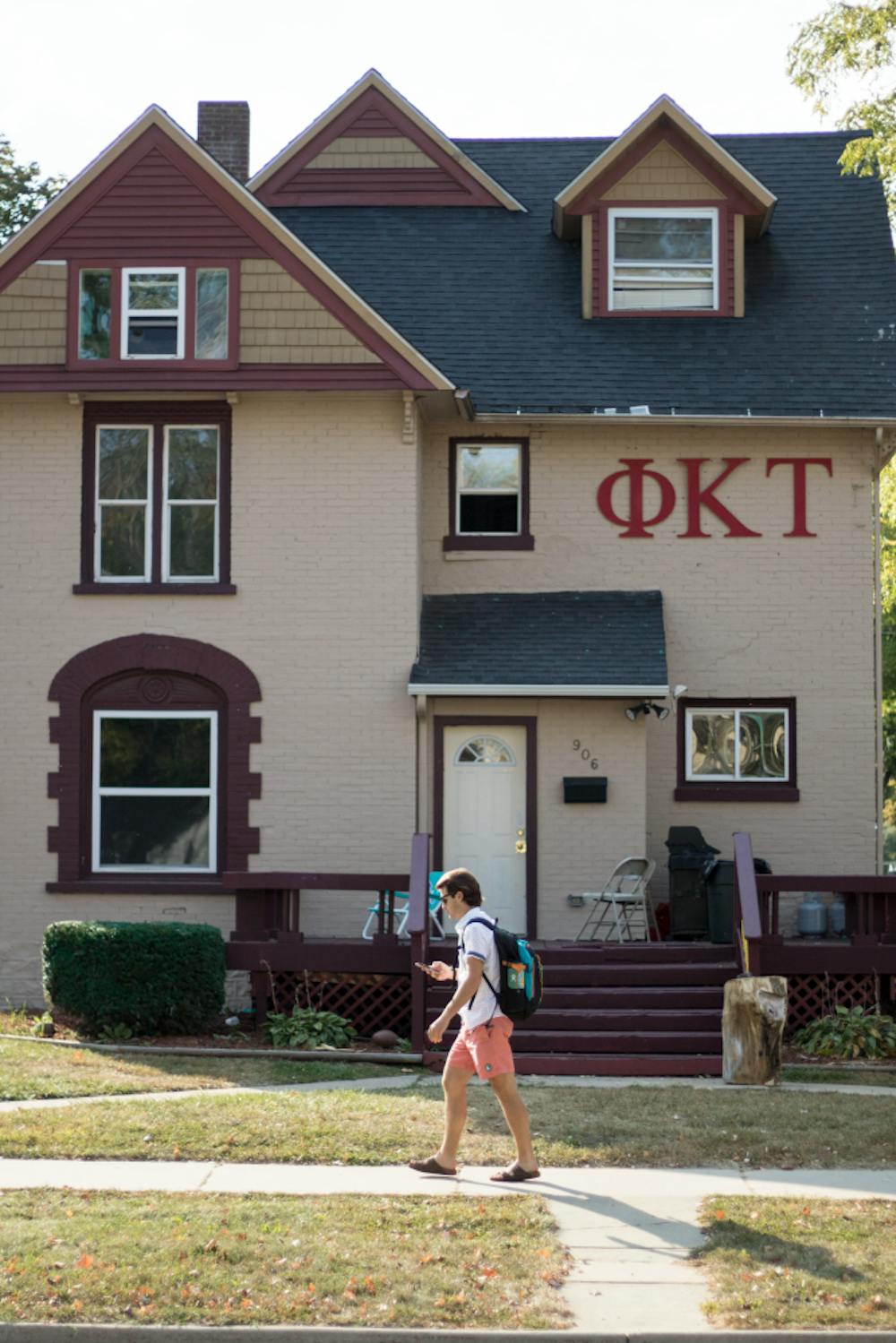Phi Kappa Tau investigation shows drinking in Pearce Hall, noncompliance with university leads to 3-year suspension
An Office of Student Conduct investigation into Phi Kappa Tau found that at the end of the Fall 2017 recruitment period, new fraternity members participated in a scavenger hunt that included drinking shots of alcohol in a Pearce Hall computer lab.
The fraternity also hosted a homecoming event near Kelly/Shorts Stadium, under a pirate flag, while serving a temporary suspension. That same day the fraternity hosted a party at its “B-House” and a photo was published on Instagram with the caption “We’re not suspended, you’re suspended!”
PKT is one of three Greek organizations that have been suspended since the beginning of the Fall Semester. Pi Kappa Phi was suspended indefinitely by the university Nov. 15 after failing to comply with prior sanctions and a hazing complaint. Sigma Lambda Gamma was suspended Feb. 7 by its national organization after a hazing complaint.
“There’s a lot of great folks in Greek Life, there are a lot of fantastic people, but you do get some folks that give everyone a bad impression,” said Tom Idema, director of Student Conduct.
The national chapter of Phi Kappa Tau issued a statement on the suspension Feb. 27.
"Following an investigation of allegations including alcohol abuse, a pattern of misconduct and hazing, the National Council made the decision to render the highest penalty which is a suspension of the chapter’s charter (closure of the chapter’s undergraduate operations)," the release stated. "It became evident after an investigation in the Fall of 2017 that this chapter was no longer providing a quality fraternal experience for men who seek to better themselves through involvement with Greek life."
Tim Hudson, chief executive officer of the national chapter said "the fraternity will continute to hold all of its members and chapters accountable for actions" that aren't in accordance with PKT's values.
"I believe the National Council sent a clear message that the actions uncovered in the investigation are not permitted within our fraternity," Hudson said in the release. "We look forward to continuing our partnership with Central Michigan University and to a successful return to the campus in the future."
According to the investigation report obtained through Michigan’s Freedom of Information Act, Phi Kappa Tau was temporarily suspended Oct. 5. The Office of Student Conduct received a complaint on Oct. 2 about a student who joined the fraternity. The student told his resident assistant about a scavenger hunt that was part of the big/little reveal, a Greek Life rite pairing a pledge with his mentor to create a big brother relationship.
“It was rough. They made us drink at every stop in the scavenger hunt to figure out who our big was,” the student was quoted as saying. “They didn’t force us to, but I felt like I couldn’t say no as they handed me alcohol and said ‘drink.’ Everyone else was doing it. I didn’t want to be the only one saying no — I got so drunk. I didn’t like the things that happened later in the night that I did because I was so drunk.”
The temporary suspension opened an investigation of the fraternity conducted by Idema and Joe Finney, assistant director of Student Conduct. Throughout the investigation, which lasted more than a month, the two interviewed several fraternity members, including executive board members and outside sources involved.
The big/little reveal scavenger hunt required new members to go to every stop and drink a shot of alcohol. When recruits arrived at Pearce Hall, they were offered shots of alcohol in a computer lab by a “big sister.” New members were instructed to bring her a coffee, or some other gift, in exchange for the shot.
Idema said big/little reveals are “higher risk activities” since alcohol is sometimes involved. His larger concern, he said, is that fraternities and sororities are not allowed to have scavenger hunts.
“Scavenger hunts happen a lot of times, but I’ve never encountered one that involved alcohol,” Idema said. “If you look at the (CMU) hazing policy, it says you’re not supposed to do scavenger hunts. The reason I’ve been given by national offices is because typically there’s a time element. If you’re running against the clock, you may do something you normally wouldn’t do in the realm of safety in order to beat the clock.”
According to the report, the “big sister” was working in a Pearce Hall computer lab that night. When she was interviewed, she told Idema and Finney she “always finds alcohol in labs in Pearce Hall” and that she had consumed alcohol at work before. Idema said the Office of Student Conduct reported her activity to the “appropriate people.”
Interview process
While Idema and Finney were conducting the investigation, the fraternity was temporarily suspended. That means the organization was prohibited from participating in any official university activities and events.
As Homecoming was nearing, PKT brothers argued they needed to host an event for alumni. They went ahead with tailgating regardless of the suspension. Members interviewed said a tailgate took place in the football stadium, but no one wore their letters. A source in the report said they flew a pirate flag instead of a PKT flag. It is also noted in the report the fraternity hosted parties at its “B-House.”
A-houses are what most people associate with the term “fraternity house” and feature the organization’s letters on it. “B-houses” are other houses that often host parties because they are less visible and aren’t immediately associated with the fraternity. The PKT parties were confirmed by a Oct. 14 photo in which members posed in front of the B-House. An additional photo in the report, posted on Instagram, shows an ‘80s themed party that took place Homecoming night with the caption “We’re not suspended, you’re suspended!”
When it comes to the difference between main houses and “B-houses,” Idema said it doesn’t matter where the party takes place the university is responsible for student safety.
“What we look at is the code of conduct,” Idema said. “The code applies to students wherever you go — if you’re on campus, off campus, doing a study abroad trip. As long as you’re a CMU student, the code applies to you.”
Many students don’t think the code of conduct applies to them at a B-house, Idema said. The Fraternal Information and Programing Group (FIPG), which is the risk management policy for fraternities and sororities, covers how these organizations should operate.
Also noted in the report is a hazing allegation. A witness said someone reported PKT members on the railroad tracks at night walking in a straight line with their hands crossed in front of them. The hazing rumor was not verified.
The fraternity’s refusal to accept its suspension factored into the length of its punishment.
“The whole idea of the suspension was to keep people safe,” Idema said.
Fraternity’s Future
In an era when Greek organizations on college campuses are receiving national attention for hazing and bad behavior, Idema said there’s not much sympathy for fraternities that can’t follow the rules. In fact, one week before the scavenger hunt that resulted in its suspension, Idema and the Central Michigan University Police Department met separately with fraternity leaders for risk management training, which covers policies on social events, reviews the university’s anti-hazing policy and includes other information.
PKT’s behavior, he added, does not help the image of Greek Life at CMU. At the beginning of the investigation, Idema said he felt the fraternity members were being honest. That opinion quickly changed after the witness statements became very similar.
“What is clear to me is that we were getting truthful information from people we were talking to until the group found out that they were being investigated,” he said. “Then, in my opinion, they all got together, got on the same page of ‘what’s our story going to be’ and gave us that story.”
The fraternity’s three-year suspension, Idema said, is intended to give the organization a “clean slate.”
“We want to allow time for the people that are in the group to move on, graduate, go be great alumni,” he said. “And when they’re all gone then you want to start a new group with brand new people who don’t have the history or the knowledge (of) what has been going on recently.”








